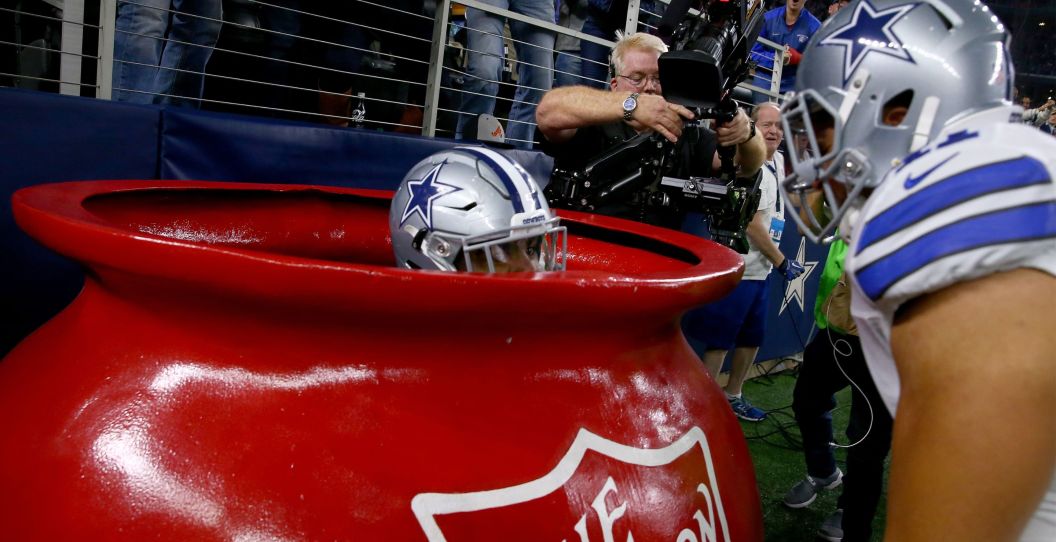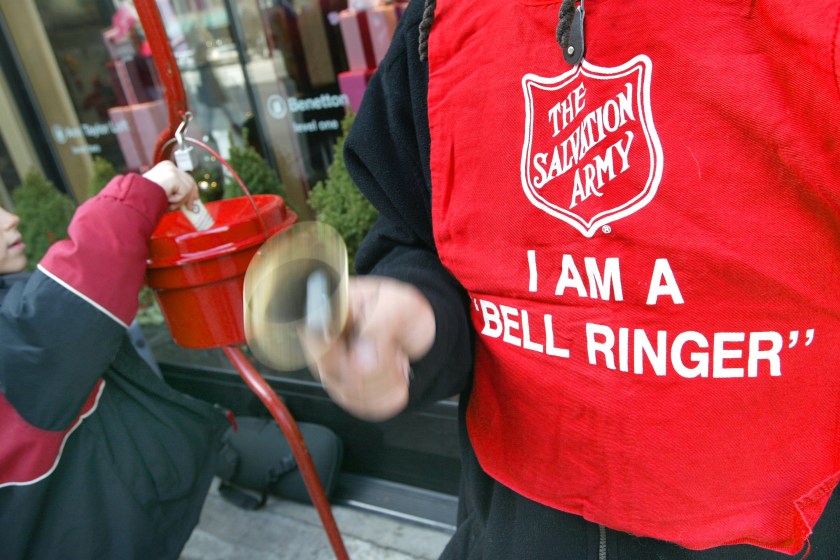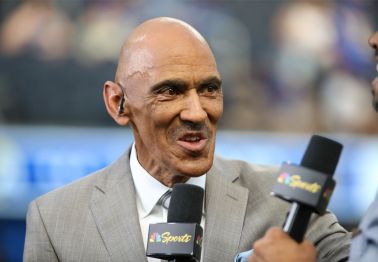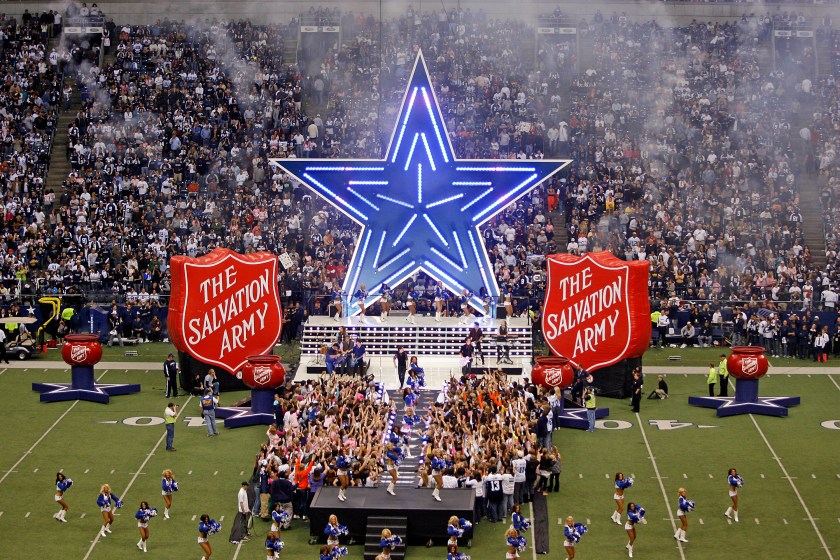One of the NFL's most recognizable traditions every Thanksgiving is the Red Kettle that resides on the sideline of Dallas Cowboys games. You've seen Ezekiel Elliott jump in it time after time after scoring. Even the Philadelphia Eagles got in on the Red Kettle celebration fun last season.
For 27 years, the Cowboys have partnered with the Salvation Army for the Red Kettle Campaign, which has raised more than $3 billion since 1997 to help the less fortunate. And this year, the partnership will be on full display when Dolly Parton performs at halftime of the Cowboys game against the Washington Commanders. Parton herself has committed $1 million to the campaign.
But to many, the Salvation Army is not exactly a symbol of open arms. The faith-based charity organization known for their bell-ringers has a record of alleged anti-LGBTQ history. Considering the Cowboys have a long, odd gay history themselves, it's an interesting marriage we can't help but talk about at the dinner table this week.
The Salvation Army has tried to change that perception in recent years, which is important considering its visibility on one of the most-watched days of the NFL season.
The Salvation Army's Anti-LGBTQ History
Back in 2013, transgender activist Zinnia Jones compiled a list of incidents that point to the Salvation Army's problematic history. That included a branch in Vermont allegedly firing a woman after learning she was bisexual in 2012, plus the organization's attempted deal with the Bush administration "ensuring that religious charities receiving federal funding would be exempt from any local ordinances banning anti-gay discrimination" in 2001.
Vox's Gaby Del Valle further noted a 2011 New York Times interview with a homeless man who claimed the Salvation Army told him to break up with his boyfriend to receive shelter in the 1990s. The Times also published a since-deleted "Position Statement" on homosexuality from the Salvation Army's website, which stated, "The Salvation Army believes, therefore, that Christians whose sexual orientation is primarily or exclusively same-sex are called upon to embrace celibacy as a way of life."
In a ThinkProgress report from 2017, a Brooklyn-based Salvation Army rehab center was found discriminating against transgender patients, a violation of city law. That same report noted a homeless shelter in Texas ran by the Salvation Army was accused of similar anti-transgender discrimination in 2014.
These incidents, the Salvation Army says, are not reflective of the organization as a whole.
RELATED: Hey, NBC. Fire Tony Dungy. Now.
"If anyone needs help, they can find it through our doors," Salvation Army director of communications David Jolley told Out Magazine in 2019. "Unfortunately, as a large organization, there have been isolated incidents that do not represent our values and service to all people who are in need."
The anti-gay perception is a tough one to combat, but at least the Salvation Army appears to be trying.
A Changing Perception
The Salvation Army's website claims the organization is one of the largest non-governmental providers of services to the LGBTQ+ community, while also giving itself a pat on the back for:
- having a dorm in Las Vegas exclusively for transgender people.
- the Harbor Light Center in Minneapolis that shelters 550 people a night, 20% of which are members of the LGBTQ+ community.
- the Young Adult Resource Center in Houston that provides day shelter to LGBTQ+ homeless youth.
- in Baltimore, the organization works with the city to "meet a growing need among transgender individuals who are trafficked."
In a 2019 editorial published by USA Today, Salvation Army national commander David Hudson wrote that the organization also operates a detox facility in San Francisco that caters to HIV/AIDS patients. In that same piece, Hudson added an interesting paragraph:
"Surely no one wants to see programs for those living in poverty eliminated simply because some disagree with the theology of those who provide them. It's true that The Salvation Army's pastoral leaders, who subscribe to the international tenets of the church on which we are founded, do themselves adhere to a traditional Biblical definition of marriage — that's also true of the leaders of most churches around the world."
It's a very "the ends justify the means" statement to all but say, "sure, our leaders may disagree with being gay, but they're still helping folks in need." But, of course, the church and the gays have never really agreed on things.
Some things can't be disagreed with: 28% of LGBTQ youth reported experiencing homelessness or housing instability at some point in their lives and those numbers are higher among transgender and nonbinary youth (numbers via The Trevor Project).
Despite the Salvation Army's recent image reconstruction, Macy's dropped them last year before the holidays. Macy's didn't say specifically why, though.
"We reevaluated our cause and community work and made a significant commitment to driving societal change by empowering underrepresented youth in our community," a Macy's spokesperson said. "With this shift, we made the difficult decision to not continue our partnership with the Salvation Army this holiday season."
So, the Salvation Army certainly appears to be working on its relationship with the LGBTQ community, and it's a mending process that will take time. But as you watch the Cowboys play this Thanksgiving, consider where you're donating before pulling out the wallet.



